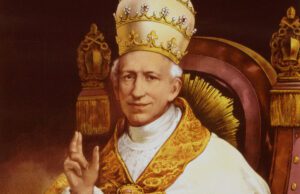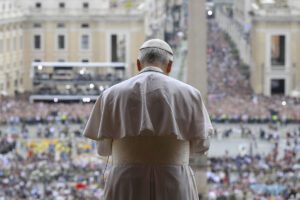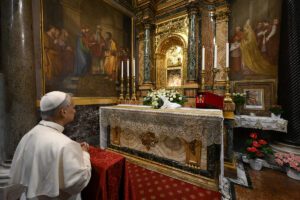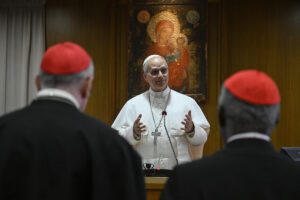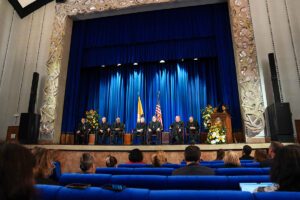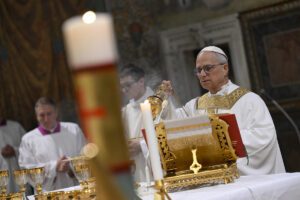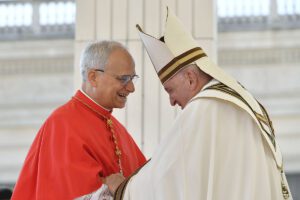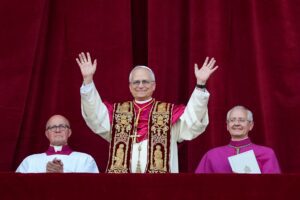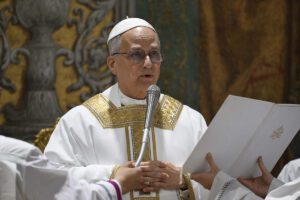VATICAN CITY (CNS) – Pope Leo XIV asked journalists to be peacemakers by shunning prejudice and anger in their reporting, and he called for the release of journalists imprisoned for their work.
“The suffering of these imprisoned journalists challenges the conscience of nations and the international community, calling on all of us to safeguard the precious gift of free speech and of the press,” the pope said May 12.
Not counting his meeting May 10 with the College of Cardinals, Pope Leo’s first special audience was reserved for members of the media who covered his election and the death of Pope Francis.
“Thank you for the work you have done and continue to do in these days, which is truly a time of grace for the church,” he told the media representatives and staff of the Vatican Dicastery for Communication.
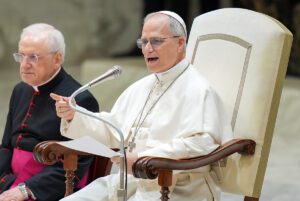
The new pope particularly thanked reporters “for what you have done to move beyond stereotypes and clichés through which we often interpret Christian life and the life of the church itself.”
After giving his speech and his apostolic blessing, the pope personally greeted dozens of journalists. One asked if he would be traveling home to the United States soon, the pope responded, “I don’t think so.”
Asked about the May 13 feast of Our Lady of Fatima, Pope Leo, referring to himself, said, “Cardinal Prevost had planned to go, but the plans changed.”
Another reporter asked the pope if he planned to fulfill Pope Francis’ promise of going to Turkey this year to celebrate the 1,700th anniversary of the Council of Nicaea with Orthodox Ecumenical Patriarch Bartholomew. The council was held in 325 in what is now Iznik, Turkey.
“We are preparing for it,” the pope responded. But he did not say when the trip would be.
In his formal talk, Pope Leo focused on how the media can promote division and discord or peace.
The Gospel beatitude, “Blessed are the peacemakers,” is a challenge for everyone, he said, but especially for the media. It calls “each one of you to strive for a different kind of communication, one that does not seek consensus at all costs, does not use aggressive words, does not follow the culture of competition and never separates the search for truth from the love with which we must humbly seek it.”
“Peace begins with each one of us: in the way we look at others, listen to others and speak about others,” he said. “In this sense, the way we communicate is of fundamental importance: we must say ‘no’ to the war of words and images, we must reject the paradigm of war.”
The words and style journalists use are “crucial,” he said, because communication is not only about transmitting information; it should create a culture and “human and digital environments that become spaces for dialogue and discussion.”
“We do not need loud, forceful communication, but rather communication that is capable of listening and of gathering the voices of the weak who have no voice,” he said.
“Let us disarm words and we will help to disarm the world,” he said. “Disarmed and disarming communication allows us to share a different view of the world and to act in a manner consistent with our human dignity.”
“You are at the forefront of reporting on conflicts and aspirations for peace, on situations of injustice and poverty and on the silent work of so many people striving to create a better world,” he told the reporters. “For this reason, I ask you to choose consciously and courageously the path of communication in favor of peace.”
The pope had told members of the College of Cardinals that he chose his name in homage to Pope Leo XIII, recognizing the need to renew Catholic social teaching to face today’s new industrial revolution and the developments of artificial intelligence “that pose new challenges for the defense of human dignity, justice and labor.”
That technology, he told the reporters, poses special challenges for them. “I am thinking in particular of artificial intelligence, with its immense potential, which nevertheless requires responsibility and discernment in order to ensure that it can be used for the good of all, so that it can benefit all of humanity.”

